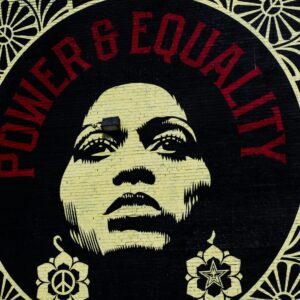
In 2022 and 2023, I worked at the National Eating Disorders Association (NEDA), the largest eating disorder nonprofit in the United States, as a helpline associate.
My job was providing peer support to folks coping with eating and mental health concerns via the NEDA Helpline, the organization’s only direct service arm. The Helpline was run by a small team of full-time workers with the help of hundreds of remote volunteers. We all loved our jobs—we just didn’t love our working conditions. We were burning out.
My coworkers and I, hired precisely because of our own lived experience with eating disorders, were operating under the false assumption that a mental health organization would care about the mental health of its employees.
When we raised our workplace concerns, we were reminded to “practice self-care,” as if a cup of tea could meaningfully address our burnout. So, we organized a union, Helpline Associates United. We wanted our jobs to embody the justice NEDA claimed to stand for. We demanded transparency, training, more staffing, our mental health prioritized, and inclusion in decision-making.
They fired every single one of us and attempted to replace our lived experience with a dangerous AI chatbot named “Tessa.”
It is bad enough that a mental health organization would fail to support the wellbeing of its staff. But what NEDA leadership did to my coworkers and me next was even worse. Upon petitioning management for better working conditions, we were subjected to a months-long campaign of targeted retaliation and workplace abuse built on lies, intimidation, humiliation, and bullying.
When we finally won our union election to affiliate with the Communications Workers of America (CWA), NEDA bosses responded with blatant, illegal union busting. They fired every single one of us and attempted to replace our lived experience with a dangerous AI chatbot named “Tessa.” Despite having to pull the chatbot almost immediately, the organization still chose to shutter the Helpline, claiming it was a “long-anticipated change.” But make no mistake: it was about silencing voices who dared to question them, and crushing worker power.
We lost our jobs. This is the worst possible outcome when organizing a union, which was only slightly mitigated by the severance payments we received. This is the stark reality of the risks that workers take on when they unionize.
For us, though, the greater risk was to remain silent. If we hadn’t unionized, the exploitation of NEDA staff and volunteers would have continued unchecked. Organizing gave us the tools not only to improve our working conditions, but to challenge broader systemic exploitation. Moreover, if we hadn’t spoken up, our story would remain unknown in the field.
Our story is part of a larger struggle. Nationally, nonprofits deliver a large share of social services, yet they operate with limited public accountability. At NEDA, I saw how boards often serve donors, not communities. I learned that HR protects employers, not employees.
Organizing gave us the tools not only to improve our working conditions, but to challenge broader systemic exploitation.
Workers can be exploited in service of “the mission” or punished for refusing to participate in their own oppression (and the oppression of others). Ethical care is unsustainable in toxic environments where workers are treated as if they’re disposable. The resulting burnout, turnover, and trauma weakens organizations, severs trust, and sabotages the very causes that nonprofits support.
Workers understand that when solutions fail to protect the most vulnerable among us, they aren’t solutions at all. This is why nonprofit organizing is about so much more than just improving workplace conditions. It is about workers standing shoulder to shoulder in solidarity, not just with each other, but with the communities they serve—and holding nonprofit organizations accountable.
Worker-led organizing shifts power away from executive leadership and wealthy donors to those on the front lines of service and advocacy, creating a counterweight to top-down decision-making.
Solidarity and unions are more than buzzwords. They are tactics that give us a glimpse of the world we deserve: a world where justice is more than words in a mission statement. Nonprofits are not going to save us. But nonprofit workers, organized in solidarity, just might.














